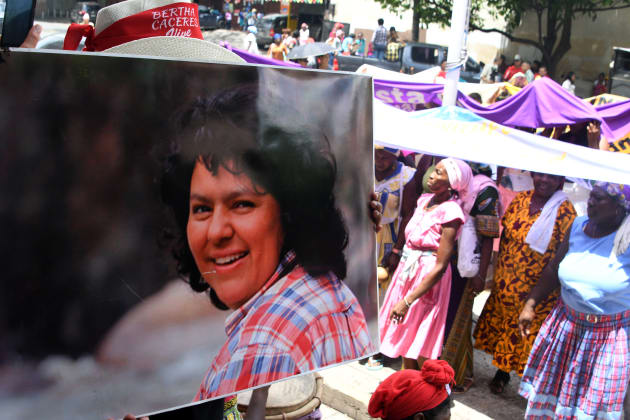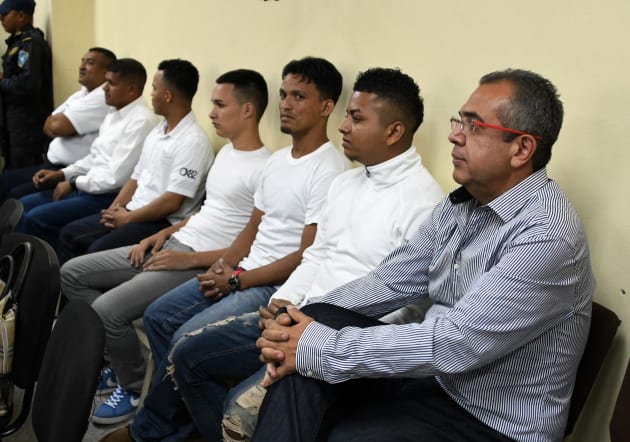Cáceres’ assassination in 2016 was one in over 130 targeted killings of environmental defenders in Honduras since the 2009 coup d’état
By Amanda Ghahremani and Leah Gardner | The HuffPost
The long awaited first trial for the murder of renowned Indigenous environmental defender Berta Cáceres was set to open on 17 September 2018 in Tegucigalpa, Honduras. Cáceres’ assassination in 2016 was one in over 130 targeted killings of environmental defenders in Honduras since the 2009 coup d’état, including various members of her organization, the Civic Council of Popular and Indigenous Organization of Honduras (COPINH). Her case has become emblematic of this tragic state of affairs, and of the struggles facing human rights activists around the world.
Two and a half years into the process to prosecute eight men accused of carrying out Berta’s murder, lawyers for her family made what was likely a painstakingly difficult decision to request the recusal of the three-judge Tribunal hearing the case. This drastic step, taken on the day the trial was set to begin, alleges abuse of authority and obstruction of justice by the judges, in part for failing to sanction prosecutors for withholding evidence.

Garifuna women protest demanding justice in the case of the murder of the Lenca indigenous leader Berta Caceres, in Tegucigalpa, on May 25, 2017. (Orlando Sierrs/AFP/Getty Images)
The victims’ lawyers submitted several other constitutional injunctions before the hearing, one of which requested that the public have greater access to the trial through a live audio transmission of the proceedings; a request that had been previously denied. The court rejected this request once again on Friday.
It is no surprise that live streaming is important to the victims in this case. Beyond a mere technical issue, diversified access to judicial proceedings lies at the heart of the concept of open justice — the idea that courts should be open, public, and accessible — and meaningful victim participation.
Honduran legislators have acknowledged the importance of open justice by guaranteeing the right to a public trial and providing some victims legal standing before the court. Honduras has also incorporated international treaties into national law through its constitution. These treaties oblige States to hold public, open trials in adequate facilities. According to the UN, the purpose is to ensure “the transparency of proceedings” and to provide “an important safeguard for the interest of the individual and of society at large.”
Before her murder, Berta was recognized around the world and throughout Honduras for her work to protect the Gualcarque River, sacred to the Lenca people, from a hydroelectric project. These same people will be deeply affected by the outcome of the trial and deserve access to the courtroom. There is also a massive transnational solidarity movement of environmental and human rights activists who are closely following this public-interest case.
Unfortunately, the Tribunal will record audio of the trial as a matter of protocol, but not for public diffusion. It is unclear when, if ever, the public would have access to the trial recordings. The inability to hear what is going on in the courtroom in real-time substantially decreases the value of a recorded hearing by impeding contemporaneous observation and participation by victims and the public. This is especially important after the first day of trial proved there were insufficient seats for many members of Berta’s community, who were forced to wait outside.
Providing overflow rooms can help rectify this inaccessibility, but there are many legitimate reasons why victims may be unable to physically attend court, including travel costs, safety concerns, psychological trauma, and the inability to adjust schedules to an unpredictable judiciary. A live broadcast would ensure access for the greatest number of people.
A live transmission is also easily attainable with advances in technology. Countries like Mexico, Brazil, Guatemala, Canada, the United Kingdom, South Africa, and India, have all moved towards live broadcasting proceedings that are in the public interest. This practice is also prevalent at the Inter-American Court, the European Court of Human Rights, and various international criminal tribunals.

Seven of the accused on the murder of indigenous environmental activist Berta Cáceres sit in court on Sept. 17, 2018 in Tegucigalpa. (Orlando Sierrs/AFP/Getty Images)
The Tribunal’s failure to take steps to provide overflow rooms or allow live streaming must be viewed in the larger context of this case. In addition to allegations of abuse of authority and withholding evidence, lawyers for the victims, members of the media, and the victims themselves have been repeatedly attacked and targeted in highly dangerous smear campaigns aimed at criminalizing and intimidating them.
The day the trial was set to begin, a prominent freelance journalist for the Guardian, and the only English-language reporter covering the trial on the ground, Nina Lakhani, was targeted online in a smear campaign by a fake group with alleged links to the Honduran intelligence, which falsely claimed she was involved in violent insurgency. Lakhani was previously targeted after publishing an article in which a former soldier claimed that Berta’s name had appeared on a U.S.-trained special forces hit list. At the hearing, three security guards informed her that the courtroom was closed to the public before she was eventually allowed to enter.
The Honduran judiciary had an opportunity last week, with the world watching, to demonstrate its willingness to ensure open courts and meaningful access to justice. Live streaming the court proceedings would have gone a long way towards greater transparency and public confidence in a judiciary facing serious allegations of misconduct. Sadly, the Tribunal failed to act.
Amanda Ghahremani is the Legal Director of the Canadian Centre for International Justice (CCIJ), a Canadian non-profit that supports survivors of international crimes to seek legal redress. Leah Gardner is currently a volunteer lawyer at CCIJ. The authors were in Honduras as members of an international legal observation mission to monitor the Berta Cáceres murder trial.
Source: https://www.huffingtonpost.ca/amanda-ghahremani/berta-caceres-murder-trial_a_23547813/

